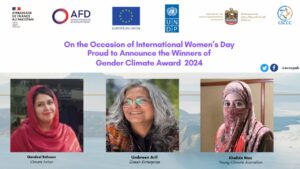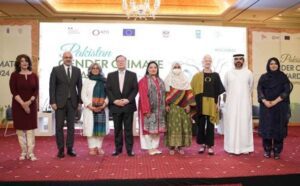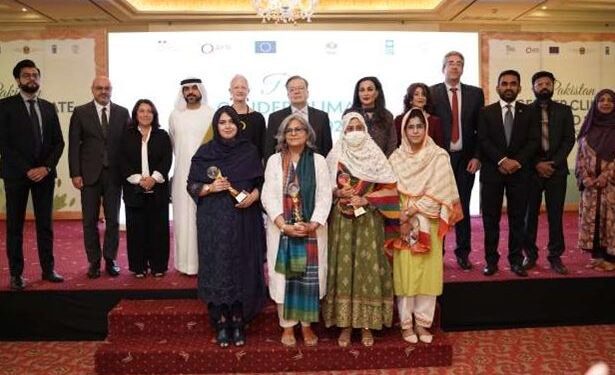To celebrate the contributions of Pakistani women in climate action, the Embassy of France, the Embassy of the United Arab Emirates, the Delegation of the European Union, the French Development Agency (AFD), the United Nations Development Programme (UNDP), and the Civil Society Coalition for Climate Change (CSCCC) held the ceremony for the 2nd edition of the Pakistan Gender Climate Award 2024. The objective of the award is to highlight women’s commitment, leadership, and concrete initiatives in the fight against climate change and its effects in three categories: climate action, green enterprise, and young climate journalism.
Who were the winners of the Pakistan Gender Climate Award 2024?

- Qandeel Rehman (Climate Action)
- Umbreen Arif (Green Enterprise)
- Khalida Niaz (Young Climate Journalism)
Each winner received a trophy and a cash award of PKR 1.2 million to advance their activities and deepen the gender-climate nexus in their areas of work.
What was the significance of the ceremony?
The Pakistan Gender Climate Award ceremony, held at the Serena Hotel, was attended by dignitaries from the Ministry of Climate Change and Environmental Coordination, diplomats, civil society, academia, youth, and the media. The Coordinator to the Prime Minister on Climate Change, Ms. Romina Khurshid Alam, lauded the initiative and pledged her support to strengthen the gender-climate nexus. In her keynote address, she stated, “Women are the change and will change the future. They are our champions, and we have faith in their capabilities.”
What were the key messages from the dignitaries?

- E. Mr. Nicolas Galey, Ambassador of France:
“We are delighted that the Gender Climate Award, which was launched last year by the French Embassy, can bring together other prestigious partners this year, and even more in the future. This demonstrates global awareness of the impact of climate change, and the need for everyone – men and women, governments, international organizations, and NGOs – to meet this challenge together. By honoring the three winners of this award, we pay tribute to the extraordinary women of Pakistan for their leadership in climate action and their efforts to find innovative and concrete solutions to make their communities more resilient.”
- Riina Kionka, EU Ambassador:
“Women are at the heart of our work in building a sustainable world. Investing in female leadership is key for climate solutions. We are delighted to honor the inspiring work of women in addressing climate challenges, be it through journalism, entrepreneurship, or advocacy.”
- Muhammad Sultan AlKaitoob, Deputy Head of Mission, UAE Embassy:
“The UAE recognizes the indispensable role that gender equality plays in building a sustainable and resilient future. Empowering women and girls not only enhances social cohesion but also accelerates progress towards achieving the Sustainable Development Goals, particularly those related to climate action.”
- Senator Sherry Rehman:
“Climate and women are inextricably linked. The impacts of a planet on fire will further erode capital of women. Spotlighting women and empowering them to become leaders is key to resilience. Events such as this should be scaled up and held every year to inspire women.”
The Pakistan Gender Climate Award 2024 exemplifies how international cooperation and local initiatives can drive significant progress in addressing climate change. The collaboration between the Embassy of France, the Embassy of the United Arab Emirates, the Delegation of the European Union, the French Development Agency (AFD), the United Nations Development Programme (UNDP), and the Civil Society Coalition for Climate Change (CSCCC) underscores the importance of a unified global effort. This partnership highlights the collective commitment to addressing climate change while promoting gender equality. The Gender Climate Award serves as a platform to showcase the contributions of Pakistani women who are leading the charge in climate action, green enterprise, and climate journalism.
Why is empowering women crucial for climate action?

Empowering women to lead climate action is crucial for several reasons. Women often face the brunt of climate change impacts, particularly in developing countries like Pakistan. By supporting women’s leadership in this field, it is ensured that their perspectives and solutions are included in climate policies and initiatives.
The award winners, such as Qandeel Rehman, Umbreen Arif, and Khalida Niaz, serve as inspiring examples of how women can drive change and create sustainable solutions for their communities. Women face significant barriers to leaving areas prone to climate change and natural disasters, exacerbated by gender roles and responsibilities.

The World Bank’s 2021 Groundswell report indicates that climate change could displace up to 216 million people within their countries by 2050. Women’s caregiving obligations, lack of financial assets, and limited land and property rights often hinder their ability to relocate from disaster-prone areas. When they manage to leave, they face heightened risks of unemployment, child marriage, human trafficking, and gender-based violence. Additionally, climate change poses disproportionately high health risks for women, threatening reproductive and maternal health. Rising temperatures, increased rainfall, and higher humidity levels foster conditions for vector-borne diseases like malaria and Zika virus, which can lead to miscarriages and anemia among pregnant women. Women also face greater food insecurity, higher mortality rates during extreme weather events, and severe mental health impacts due to climate change.

Despite their crucial role in protecting their communities and natural resources, women environmental leaders frequently encounter gender-specific threats designed to silence them, including verbal abuse, harassment, intimidation, and sexual violence. Moreover, women remain underrepresented in decision-making spaces and climate change negotiations, with men occupying 67% of climate-related decision-making roles and women’s representation in national and global climate negotiating bodies falling below 30%. This exclusion is reflected in the inadequate funding for female-led climate initiatives, with only 3% of philanthropic environmental funding supporting women’s environmental activism. Despite the essential insights women bring to sustainability due to their caregiving roles, they struggle to access funding for their initiatives, which are crucial for effective climate change adaptation and mitigation. The 2022 SDG Gender Index highlights insufficient global progress on gender equality between 2015 and 2020, with climate action (SDG 13) being one of the lowest-scoring goals, even in high-performing countries. Integrating gender into climate plans, policies, and strategies is critical for addressing the differentiated needs of women and protecting their rights in the face of the climate crisis.
How do international collaborations support climate change action in Pakistan?
The Pakistan Gender Climate Award 2024 exemplifies how international cooperation and local initiatives can drive significant progress in addressing climate change. The collaboration between the Embassy of France, the Embassy of the United Arab Emirates, the Delegation of the European Union, the French Development Agency (AFD), the United Nations Development Programme (UNDP), and the Civil Society Coalition for Climate Change (CSCCC) underscores the importance of a unified global effort. This partnership highlights the collective commitment to addressing climate change while promoting gender equality. The Gender Climate Award serves as a platform to showcase the contributions of Pakistani women who are leading the charge in climate action, green enterprise, and climate journalism.
What is the impact of empowering women on Pakistan’s climate action?
Empowering women in Pakistan to lead climate initiatives has profound implications. Women bring unique perspectives and innovative solutions to climate challenges, addressing issues from grassroots levels to policymaking. For example, Qandeel Rehman’s initiatives in climate action focus on community-based solutions that are both sustainable and scalable, making significant impacts on local resilience.
How does the Gender Climate Award influence future generations?
Programs like the Gender Climate Award not only recognize current efforts but also inspire future generations of women to engage in climate action. By providing financial support and public recognition, these awards help winners expand their initiatives and serve as role models for young women and girls. This creates a ripple effect, encouraging more women to take on leadership roles in environmental sustainability. For instance, Umbreen Arif’s success in green enterprise can motivate young female entrepreneurs to explore sustainable business opportunities.
How can we scale up these initiatives?
The Pakistan Gender Climate Award 2024 illustrates the critical role that women play in addressing climate change. By highlighting and supporting their contributions, this initiative not only promotes gender equality but also enhances the effectiveness of climate action. As we look forward to future editions of the award, it is clear that empowering women to lead in climate action is a vital strategy for building a sustainable and resilient future for all. Expanding such initiatives and fostering international partnerships can further amplify these efforts, ensuring a broader and more lasting impact on climate resilience and gender equality.
Read the latest cultural diplomacy initiative of EU in Pakistan
And the latest initiative of UAE in Pakistan through SZIA School
Check the Press release of CSCCC
















